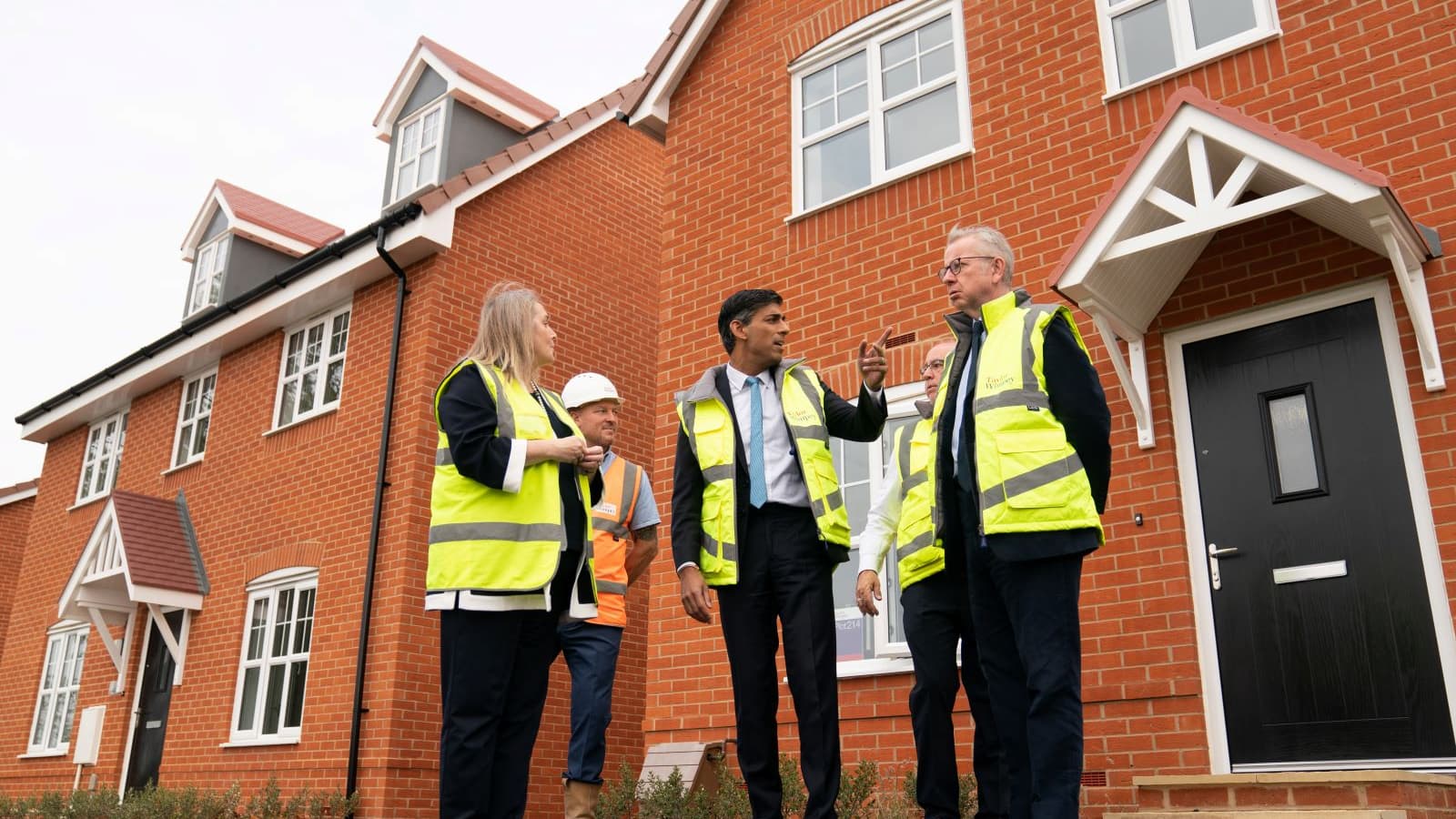Rishi Sunak proposes '1% deposits' for first-time buyers — but is it a good idea?
Rishi Sunak is considering introducing a 1% deposit for first-time home buyers to help younger generations get on the property ladder. We look at how this would work and if it is a good idea

Rumours have spiralled that the government is looking to introduce 1% deposits for first-time buyers to help those struggling to get onto the property ladder.
The decision comes after it was revealed that the number of first-time buyers in 2023 was 100,000 less than the previous year with the average age of a first time buyer increasing to 34.
However, the proposal has prompted some experts to claim the decision is merely a vote-grabbing attempt to appease the younger generation which has been left frustrated by mortgage rate increases caused by rising inflation. Although, others have called it a "great solution" to the problems faced by first-time buyers.
How would the scheme work?
The proposed idea would mean borrowers would only need to put down a 1% deposit on their first home.
The government would support lenders by offering 99% loan-to-value (LTV) mortgages, enabling thousands to buy a home without an excessive down payment with banks currently requiring minimum deposits of 10%.
This policy goes beyond the expired Help to Buy Scheme, requiring only a 1% deposit instead of the former 5%, and aligns with the extended mortgage guarantee scheme to help first-time buyers get on the property ladder.
Why are the government proposing this?
With an election looming this year and the government failing to tackle the housing crisis the scheme is seemingly aimed as a vote winner by helping younger generations get on the property ladder.
Get the Homebuilding & Renovating Newsletter
Bring your dream home to life with expert advice, how to guides and design inspiration. Sign up for our newsletter and get two free tickets to a Homebuilding & Renovating Show near you.
In 2021-22, there were 852,000 first-time buyers in England, 100,000 less (11%) than the previous year, according to Uswitch, with the average age of first-time buyers being 33.5, which is 1.3 years higher than two years previous.
This shows that recent schemes, such as the Affordable Homes Programme, have failed to adequately address the difficulties faced by younger generations in buying their first home.
Mortgage rate rises and house price increases over that period have also made buying a house unobtainable for many, which the government has aimed to address.

Experts disagree on the impact of 1% deposits
The government's proposed 1% deposits idea has sparked debate amongst mortgage and home buyer experts, with some claiming the idea could help first-time buyers combat problems in the current market, whilst others have described it as a "desperate attempt at a vote-catcher".
David Hannah, group chairman of Cornerstone Tax has warned the scheme could results in a 2008-style housing bubble due to excessive demand for houses in a restricted housing stock.
He stated: “These reports of a 99% mortgage loan-to-value mortgage coming from No.10 showcases the utmost desperation from politicians looking for an easy-fix to one of the most prescient issues for young voters, affordability. In my view, encouraging first-time buyers to take on increasingly unaffordable debts is not a viable long-term solution to Britain’s housing woes.
“The move amounts to piecemeal political tinkering whereby the root causes of the current crisis remain unaddressed, the nation’s dwindling housing stock, record-high interest rates and a stamp duty regime that refuses to shift towards current market trends must be addressed by policymakers if the government wants to get Britain buying again in 2024."

David specialises in providing guidance on Stamp Duty Land Tax (SDLT) and other taxes related to property transactions. David extends his advice and strategies to clients of solicitors, accountants, banks, wealth managers, and trust companies both in the UK and internationally.
Michelle Lawson, mortgage advisor & director at Lawson Financial Ltd, added: "Yet another desperate attempt at a vote-catcher rather than coming up with something with serious legs but the devil, as always, is in the detail.
"Affordability and stress testing is more the issue than the deposit for first-time buyers in most areas due to the house prices. A 1% deposit is dangerous as most would take a long term of say 30, 35 even 40 years so the borrowers actually pay little off in the early years so there is a high risk of either negative equity or being a mortgage prisoner if not modelled correctly.
"Serious thought should be given to some of the most vulnerable buyers and the focus should be on housing being a senior department rather than using it as an election bribe."

Michelle is fully CeMap qualified (Certificate in Mortgage Advice and Practice). Her wealth of knowledge and expertise is reflective with her reputation locally and nationally as an expert mortgage advisor.
Jonathan Rolande, director of The National Association Of Property Buyers, agreed stating: “In the short-term, it may produce a honeymoon where some young people who could not afford to (before) get on the ladder and are very happy.
“Giving people money to go out and buy, it means they are all competing with each other for the same limited number of homes, so it will push up prices. In a few years’ time we’re back with the same problems – a shortage of housing.”

Throughout his 30-year career, Jonathan has completed over 700 property purchases and sales, providing thoughtful and measured insights into the dynamic and sometimes unpredictable world of real estate. Leveraging his unparalleled experience across various aspects of the sector, Jonathan is a respected authority featured in national press, trade journals, television, and radio. In 2013, he established The National Association of Property Buyers, demonstrating his commitment to enhancing standards for property buyers.
However, Mark Harris, chief executive at Saville's SPF Private Clients (SPF), said: “99% mortgages could be a good idea in the appropriate circumstances. With added stamp duty costs, a 99% mortgage can look identical to a 95% mortgage for previous generations.
“Add in the fact that saving for a deposit for those renting these days is almost impossible, this could be a great solution."

A founding member of Savills Private Finance in 1997, later rebranded to SPF Private Clients after a management buyout in 2011. In August 2022, SPF joined the Howden Group. He specialises in high-value mortgages and intricate finance arrangements in the UK and internationally. He regularly offer insights on the mortgage market for both national and international press, as well as financial publications.

News Editor Joseph has previously written for Today’s Media and Chambers & Partners, focusing on news for conveyancers and industry professionals. Joseph has just started his own self build project, building his own home on his family’s farm with planning permission for a timber frame, three-bedroom house in a one-acre field. The foundation work has already begun and he hopes to have the home built in the next year. Prior to this he renovated his family's home as well as doing several DIY projects, including installing a shower, building sheds, and livestock fences and shelters for the farm’s animals. Outside of homebuilding, Joseph loves rugby and has written for Rugby World, the world’s largest rugby magazine.
